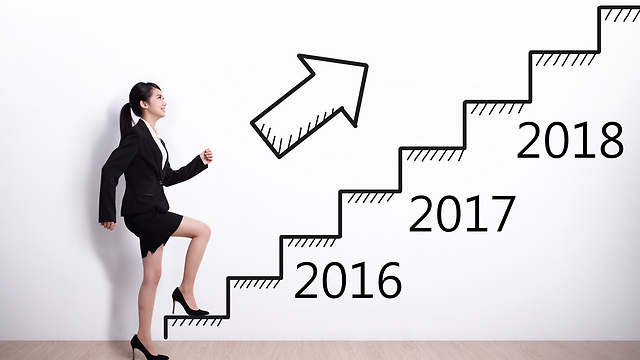
The Israeli woman: more educated, more professionally satisfied, but still earning less
A report by the Central Bureau of Statistics clarifies the state of women in Israel, especially compared to men; They earn less, live longer, get in less accidents and are more educated.
According to a new report, even though women in Israel are more educated and are generally more satisfied with their occupations, they still earn less and are in less managerial positions than men.
These are just some of the conclusions drawn from the yearly report by the Central Bureau of Statistics (CBS) made public on Monday ahead of International Women's Day, celebrated on March 8.
The report also found that though the majority of Israeli women are pleased with their lives, more than a quarter of them feel stressed, be it often or always.
Earning less
In 2015, the salary of a woman in the workforce in Israel is NIS 7,666, while men in the workforce earn an average of NIS 11,219. The gap in average monthly income between the genders was 31.7%.Some of the gap is caused by the difference in work hours: 44.9 average hours a week for men and 36.7 for women. However, even with this factored in, the difference still comes to 15.1%.
Women are also employed more in positions that require an academic degree (57.2%), while nevertheless reaching less managerial positions (34.1%).
Less involved in the workforce
The percentage of women above the age of 15 who were part of the workforce in 2015 was 59.4%, as opposed to 69.1% of men.32% of women were employed at temporary jobs, as opposed to 13% of men.
More educated
In 2015, 69% of women graduated highschool, as opposed to 56% of men. The percentage of women were eligible for higher education was also higher (56%) than that of men (46%).
Living longer and prospering—on wellfare
According to the data, women's life expectancy in Israel in 2015 was 84.1, as opposed to 80.1 for men. In the decade between 2005 and 2015, the life expectancy for both men and women increased by 1.9 years.About 51,000 women married in 2014, 90% of them for the first time. The average age of women entering their first marriage was 25. The average age of first-time Jewish (25.9) and Christian (25.8) brides was higher than that of Druze (24.1) and Muslim (22.2) brides.
Some 173,800 women gave birth in 2015. The average number of children an Israeli woman is expected to have is about 3.1, higher than the average among OECD countries, which is 1.7.
In 2015, about 710,000 women were registered in social welfare programs, representing 54% of all those registered.
Better drivers
In 2015, about 1.7 million women had a driver's license. Among Jews, women stood for 43% of the total number of people permitted to drive, while women represented only 36% of eligible drivers in the Arab community. In general, the rate of women eligible to drive is steadily rising.
In 2016, women represented 41% of the injured and 24% of deaths in vehicular accidents. However, they represented only 25% of drivers involved in serious car accidents (ones involving injuries) in 2016, and only 11% of drivers involved in fatal car accidents.
Satisfaction vs. depression
90% of employed women ages 20 and above claimed to be satisfied with their jobs in 2015, as opposed to 87% of men. 58% of women claimed to be satisfied with their financial situation.
Nevertheless, 27% of women claimed they either often or always feel stressed. 19% of women reported suffering from stress-related sleep deprivation. A similar percentage of women claim they rarely, if ever, feel motivated.
8% of women reported frequent feelings of depression. 9% of women reported feeling they have no one to turn to at a time of crisis, as opposed to 5% of men.











